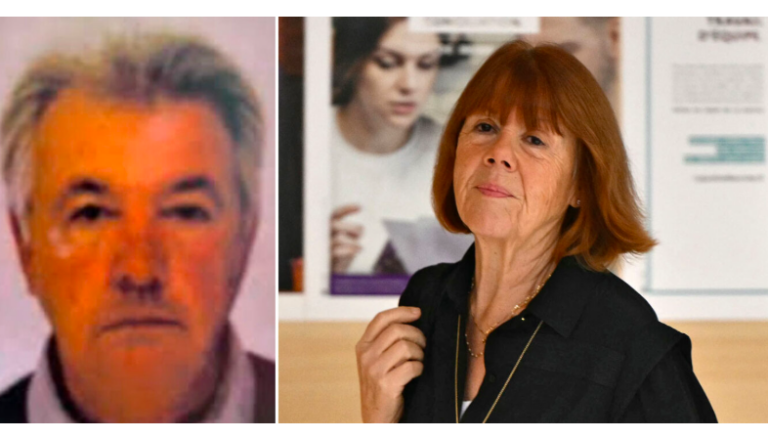Hello there! With the holiday season upon us, it seems the Christmas spirit is spreading, and the idea of goodwill is more prominent than ever. Let me begin with an event that took place yesterday at the Ministry of National Defense. Thanasis Laskaridis and his family laid the foundation for the new building of the Special Cyber Unit of the Hellenic National Defense General Staff (GEETHA), which will be constructed thanks to a donation by the “Athanasios C. Laskaridis Foundation,” named after him.
The modest ceremony was attended by Minister Nikos Dendias, Deputy Minister Yiannis Kefalogiannis, the host, GEETHA Chief General Dimitris Choupis, and a select few distinguished guests, including U.S. Ambassador George Tsounis and Chania MP Sevi Voloudaki. Minister Dendias expressed his gratitude for the donation, noting that last year, donations to the Ministry of Defense amounted to €234,000, while this year they soared to €26 million. Interesting, right?
But even more striking was the closing remark of the donor, Thanasis Laskaridis, which I’ll quote verbatim: “After all, as the popular song says, dedicated to poor Loukas, we won’t take a single penny to the grave. It’s good, then, for those whom God has blessed with some surplus to do something to help our homeland. It’s time for all of us to get rid of the ‘crabs in our pockets’ and do whatever we can, whatever is necessary.”
Dendias’ Commentary and Military Camp Rumors
During the same event, Dendias couldn’t avoid questions from those present about the well-known issue (regarding the President of the Republic), jokingly responding, “Well, I’m probably the last person who could comment on this matter,” which, of course, has been settled for a while now—if it was ever truly open.
On the other hand, the Minister was much more talkative about efforts to modernize military camps, making sure to throw in a jab about the sparse rumors suggesting that the areas formerly used as camps will be turned into business ventures. “When someone wants to slander another person or initiative, they immediately turn it into a story about interests and that’s the end of it,” he remarked.
The Registrar’s Anxiety (Which Has Ended) Over Pavlos
Possibly today—or at the latest tomorrow—the former royal family will take action regarding their citizenship. Whether their lawyer will show up, as happened with Michel de Grèce, or Pavlos himself will make an appearance, I can’t say for sure.
However, what I can say is that yesterday at the Athens Registry Office, there was quite a commotion, with phones ringing off the hook as employees scrambled to handle all the technical details of the forthcoming request. This was complicated by the fact that certain procedures have been digitized since the Venizelos law. After all, it’s not every day that the former royal family gets added to the records.
I hear that written instructions were issued yesterday by the Ministry of the Interior to ensure everything goes smoothly when the request is made. The process is simple: the request is submitted, the Registry Office forwards it to the Ministry of the Interior along with the required documents, and the Ministry determines whether the applicant can be registered or not.
That’s what we reported this morning. Eventually, at 11 a.m., it was confirmed that Pavlos and Nikolaos submitted the relevant application at the Athens Registry Office through their proxy lawyer. The surname they chose is “De Grèce,” and a total of 10 members of the former royal family have signed the application.
Elections in the Regional Unions
It’s a day of decisions for the Union of Greek Regions, as today the successor to Tzitzikostas will be chosen. The role is expected to go to the governor of the South Aegean, Giorgos Hatzimarkos. Following Nikos Hardalias’ announcement that he is withdrawing from the Presidency, the first vice-presidency is set to go to the governor of Crete, Stavros Arnaoutakis, and the second vice-presidency to the governor of the Peloponnese, Dimitris Ptochos.
5% Decrease in Abstention Due to Electoral Roll Cleanup
The Ministry of the Interior has received very few applications to reverse deletions from the electoral rolls. This means that in the next national elections, the number of registered voters will be approximately 440,000 fewer. These are individuals aged 80 and above who have had no physical presence in the country or have passed away but had not been removed from the rolls until now due to unreported deaths to the relevant Greek authorities.
These individuals contribute to the abstention rates, inflating them by about 5%.
Parliament’s New Year Under the Shadow of Presidential Speculation
Parliament will suspend its work tonight for the holiday season and is expected to reopen on January 8. Don’t ask me about the legislative agenda because I estimate that the only topic occupying the political and journalistic scene will be the individual proposed by Kyriakos Mitsotakis for the position of President of the Republic.
The Prime Minister stated in his interview with ERT that he would reveal the name within the second half of January, triggering another wave of speculation.
The official process is expected to commence in Parliament in early February 2025. According to the Constitution, the absolute deadline for the first vote is February 13, one month before the end of Katerina Sakellaropoulou’s term. The first vote requires a majority of 200 MPs; the same threshold applies for the second vote, which takes place five days later. The third vote lowers the threshold to 180 MPs, the fourth to 151 MPs, and, finally, the fifth requires only a relative majority.
Poor Anagnostopoulos, what a fate you’ve met
After the €5.5 million fines issued yesterday to eight multinational companies, and with more likely to follow for retail chains, no one would want to be in the shoes of the General Secretary of Commerce and Consumer Protection, S. Anagnostopoulos. The General Secretary has been invited tomorrow, Friday, to speak at an internal event of SELPE, the association of major retail chains. The big retail chains are up in arms over the fines, as they believe that the system implemented by the ministry is intentionally convoluted and complex, aimed at imposing fines they deem to serve public relations purposes. So tomorrow, Anagnostopoulos is expected to face heavy pressure as they demand clear rules. Meanwhile, note that a total of 26 companies—multinationals, food manufacturers, and other consumer goods firms, as well as supermarket chains—are under investigation to determine if they comply with the law on profit margin caps. Yesterday’s announcements involved eight companies, so expect more to come in the next few days. The last law passed by Parliament for 2024 extends the validity of the law on “caps on gross profit margins for all products essential for consumer nutrition and dignified living” until April 2025. For now, the government’s intention—provided market conditions stabilize—is not to extend the measure further beyond April, but I wouldn’t bet on it.
Hotels: A new investor for Attica
Banks are aiming to increase their financing and are closely monitoring tenders and other processes for the sale of European banks’ maritime loan portfolios. Piraeus Bank has taken a significant step by providing over €100 million in financing following a competitive process to the Cypriot Thanos Resort & Hotels, owned by Thanos Michaelides. Michaelides plans to expand his presence in Greece’s hotel sector. The group, which includes the Anassa in Paphos, intends to invest in Attica and Milos.
The race to break the €4 barrier
Speaking of Piraeus Bank, its stock is once again approaching the €4 mark—the level at which a placement was made last March for 27% of the share capital. Since then, the stock has only managed to stay above this level for three trading sessions, closing at the same price on three other occasions, with an intraday high of €4.08. Yesterday it closed at €3.91, showing an inclination to move toward €4. However, there’s often a gap between intention and reality. We’ll see if the stock gets closer to the generous target prices given by analysts, which range from €5 (Deutsche Bank), €5.90 (JPM), and even €6.31 (Eurobank Equities).
Salary increases at SEV
The new president of SEV (Hellenic Federation of Enterprises), Spyros Theodoropoulos, brings extensive experience in business transformations and restructuring. He’s undertaking a similar effort at SEV, implementing a new organizational chart and redistributing responsibilities. The goal is to bring SEV’s members closer to society and to activate all members of the Board of Directors and Executive Committee in SEV’s daily operations. This ambitious effort demands considerable work from SEV’s 60 employees, which is why one of the new administration’s first decisions was to significantly increase their salaries.
Manousakis’ term at ADMIE renewed
Last night, ADMIE Holdings sent a letter to the Chinese State Grid announcing the renewal of the term of ADMIE SA’s Chairman and CEO, Manos Manousakis. The term has been renewed for four years. The Board of Directors will meet tomorrow, Friday, to approve the renewal.
€110 million investments in clean energy storage
Staying in the energy sector, Deputy Energy Minister Alexandra Sdoukou met yesterday with representatives of 15 companies selected in the first two energy storage tenders. The government aims to expedite the construction of energy storage stations, offering operational support and investment aid. Investors, who collectively are investing €110 million in lithium battery energy storage systems, highlighted key issues they face, primarily the need for new connection infrastructure, such as the development or expansion of substations and networks. These processes are often delayed due to lengthy equipment procurement timelines. Additionally, delays in licensing procedures that impact overall project progress were also discussed. Sdoukou pledged to support each case individually, announcing the creation of a special coordination team. This team will work closely with ADMIE, RAE, and DAPEEP to resolve all licensing and technical issues. Timely project completion is critical, as they are funded by the Recovery Fund under strict deadlines. Let’s see if anything gets done!
Lavipharm’s Investment
Lavipharm’s new investment in transdermal drug production is set to launch in early 2025. The modifications and expansion of part of the production facilities in Paiania have already been completed, and the mechanical equipment is arriving in Greece in the coming period. This investment is a cornerstone of the pharmaceutical company’s business plan, as it will double its transdermal production capacity, while the addition of the new production line ensures uninterrupted manufacturing. Over the past five years, Lavipharm has achieved a 55% increase in its market share, and its management has stated that it is exploring opportunities for new drug acquisitions while also making new moves focused on pharmaceutical production.
Alumil’s “Trump Trade”
Alumil, led by G. Mylonas, is steadily moving towards a market capitalization of €150 million. Its stock, now at €4.59, is 58.2% higher than three months ago. After struggling through the tough years of 2013–2022 and eventually reaching an agreement with banks and servicers to handle its heavy debt load, Alumil is beginning to see light at the end of the tunnel. The next step is to spin off its casting division and sell 70% of the new company (Alufond) to a foreign investor. G. Mylonas, encouraged by Trump’s election, has turned his gaze across the Atlantic, aiming to finalize the deal within the first quarter of 2025. Even if it slips to the second quarter, it’s no big deal—after all, in the market, you hear a lot of talk but see little action.
Window Dressing
Next week, the Athens Stock Exchange will remain closed on Christmas Eve, Christmas Day, and the day after. Opportunities for short-term investment strategies are extremely limited. The primary goal of window dressing remains a top priority. As previously mentioned, Piraeus Bank aims to bridge the gap to the €4 placement level (yesterday it closed at €3.91, up +1.79%) so that those who invested at that time don’t end the year in the red. Similarly, National Bank has risen to €7.70 (+1.45%), Athens International Airport to €8, Cenergy to €9.25, and so on. By Tuesday, December 31, everyone will close their books with satisfaction and present the results of their efforts to shareholders, investors, and stakeholders. These movements, coupled with the lack of large-scale strategic placements, have brought the General Index to 1,455.67 points, with a modest increase of +0.2%. While trading volume may appear higher, it isn’t—of the €155.3 million total, €57.1 million came from a large Eurobank package and several smaller ones, leaving €85 million in stock trades on the board. Once again, Coca-Cola HBC, typically the General Index’s reliable supporter, remained at €32.80 (-1.5%), leaving OPAP (+2.21% at €15.74) and Motor Oil (+1.38%) to take over its role. Meanwhile, a consistent seller is holding PPC at €11.70, despite analysts’ glowing reports making headlines.
Nuclear Energy and Artificial Intelligence: Parallel Paths
Yesterday, Meta published an RFP (Request for Proposals) seeking a provider for a nuclear energy installation of up to 4 gigawatts to meet the growing energy demands of its data centers. This move reflects a broader trend in the artificial intelligence industry, where the exponential growth in computational requirements is creating unprecedented demand for stable and reliable energy. Meta’s strategy to place nuclear plants near its data centers aims to minimize energy transmission losses. Given that Meta is already the largest corporate buyer of renewable energy in the U.S., with 6.7 GW in operation, this step marks a new era where nuclear energy suddenly emerges as a key pillar for the growth of artificial intelligence.
Ask me anything
Explore related questions





